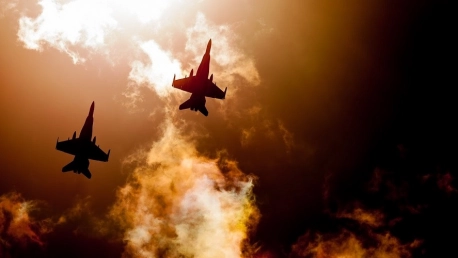The number of civilian casualties is on the rise in what came to be known as the most serious conflict in the Gaza Strip since 2014. Fighting between Israelis and Palestinians continues, as United Nations (UN) experts voice their concerns about the possibility of a “full-scale war” erupting in the region. While the UN calls for an immediate cease-fire and US diplomats rush to the scene, the conflict seems only to deepen as time passes. A month of rising tensions in Jerusalem, a city that both Israel and The Palestinian National Authority see as their own capital, fuels a conflict that has been going on for decades.
The Gaza crisis has already caused a deepening sense of international unease, but this doesn’t mean the resolution is anywhere in sight. The region continues to be plagued by multiple issues decade after decade, and, with no solution in sight, escalating violence may be seen as the only option for those involved. Will UN and US officials manage to convince the two sides to begin peace talks or will the conflict worsen? The answer might be even more complicated than we think.
What Started the Current Attacks?
While the real conflict between Israelis and Palestinians is, in fact, an 100-year-old issue, the current attacks started on April 13. Palestinians in Jerusalem rebelled after as barriers were placed at the Damascus Gate entrance to the Jerusalem’s Old City. These barriers were preventing Muslim Palestinians from meeting there after the prayers traditionally held to mark the first night of the Islamic holy month of Ramadan. The troubles added to the fact that Palestinian President Mahmoud Abbas was already facing intense pressure to postpone planned elections. He would latter come to put off these elections, while also putting the blame on Israel.
A few days later, Palestinians started firing the first rockets at Israel, which latter responded with air strikes. Clashes between the two forces continued during the following days, with notable bursts of violence at the al-Aqsa mosque compound on May 8 and 10. Palestinian resistance groups in Gaza, like Hamas, went on to issue an ultimatum asking Israel to withdraw troops from Al-Aqsa, among other requests. After the ultimatum deadline expired without any response from Israel, Palestinian forces fired rockets towards the city of Jerusalem for the first time in years. Israel would go on to retaliate by striking the city of Gaza, destroying a building housing news outlets and the home of Yahya Sinwar, Hamas’s leader.
Will Political Actors Unite for Peace?
UN officials were among the first to voice concern and ask for a suspension of hostilities, with Human Rights High Commissioner Michelle Bachelet asking for de-escalation in tensions and advising both sides to adhere to international law. “The situation in the Occupied Palestinian Territories and Israel has deteriorated at an alarming rate,” she stated, while noting the expulsions of Palestinian families in the region, the assaults around the al Aqsa mosque during Ramadan, and the intensification of attacks from and on Gaza, among others. She went on to advise both sides, as well as every country that wields some influence in the region, to take immediate action to ensure the observance of international laws and to ease tensions.
While another UN official and Middle East envoy, Tor Wennesland, warned that this crisis might escalate towards a full scale war, the European Parliament called for “an immediate and unconditional end to the blockade and closure of the Gaza Strip, which has resulted in a deteriorating, unprecedented humanitarian crisis in the area.” European officials also stated that the Palestinian presidential and parliament elections are extremely important, and that this serious conflict must be seen within the broader context of the Middle East peace process.
Peace in the Middle East
Peace may be a word on everyone’s lips these days, but officials have a hard time advancing the much-needed negotiations. Violence in the region continued to grow even as US envoy Hady Amr arrived in the Israeli city of Tel Aviv for de-escalation talks. Although President Joe Biden phoned Israeli Prime Minister Benjamin Netanyahu and Palestinian President Mahmoud Abbas, both sides said they will continue their cross-border strikes. Netanyahu actually promised the Gaza attacks will continue “as long as necessary,” although envoys from the US, UN and Egypt have already arrived in the area and begun peace talks.
Policymakers and officials around the world already know that bringing peace to the Middle East is one of the hardest diplomatic tasks in modern history. As May 15 approached, however, people around the world started to show signs of losing their patience and took to the streets in order to show support for Palestinians everywhere, while also asking for peace. Protesters in the US demanded an end to the airstrikes and “Freedom for Gaza.” May 15 is also Nakba Day, a day to remember the 1948 exodus of hundreds of thousands of Palestinians amid Israel’s declaration of independence. With its passing, however, many are left wondering if we lost yet another chance of bringing peace to the Middle East.









